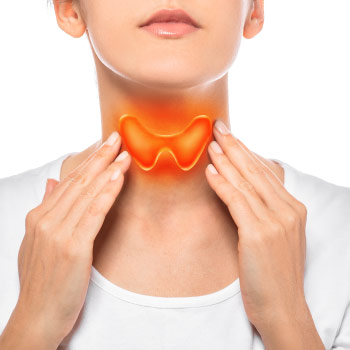
Chinchwad
USFDA Approved Procedures
Minimally invasive. Minimal pain*.
Insurance Paperwork Support
1 Day Procedure
A thyroidectomy is the surgical removal of the thyroid gland (partial or total) for a variety of reasons such as thyroid nodules, hyperthyroidism, etc. The amount of thyroid tissue to be removed depends on the severity and the nature of the thyroid disease.
The thyroid gland is a small butterfly-shaped gland at the base of the neck that controls the metabolism. Hence, thyroid diseases can wreak havoc on the entire body if not treated properly in time.
While for some thyroid issues such as Graves’ disease, hyperthyroidism, etc., medical management is possible in mild cases, for others such as thyroid nodules, thyroid cancer, etc., immediate surgical management is preferred.
At Pristyn Care, you can consult the best ENT specialists in Chinchwad for expert consultation and treatment regarding thyroid issues.

Conventional thyroidectomy
Transoral thyroidectomy
Endoscopic thyroidectomy
Total thyroidectomy
Subtotal thyroidectomy (STT)
Thyroid lobectomy (Hemithyroidectomy)
Thyroid isthmusectomy
Hospitalization: 1-2 days
Resume work: 5-6 days
Perform strenuous exercise and activity: 10-14 days
Total recovery: 3-4 weeks
Graves disease
Thyroid storm
Thyrotoxic crisis
Metastasis of thyroid cancer
Airway obstruction
Difficulty in speaking and swallowing , etc.
Thyroid cancer can be completely cured through thyroidectomy and radiotherapy.
Thyroid disease can occur in people of any age and gender.
You may need to take TSH and thyroid hormone supplements for a long time after surgery.
Only 5% of thyroid lumps are cancerous.
Benign lumps can grow and cause problems like airway obstruction , difficulty in speaking and swallowing, etc.

Treatment
Proper diagnosis is necessary to provide the right treatment for full recovery without recurrence. The diagnosis begins with a proper medical history to determine the cause of the disease. Once the history is taken, the doctor will perform several diagnostic tests to determine the exact nature of the disease.
Depending on the type and severity of the patient’s symptoms, the doctor may order additional diagnostic tests such as antibody tests, endoscopy, etc.
Depending on the cause and severity of the symptoms and the patient’s and surgeon’s preference, the surgeon will determine the amount of the thyroid tissue to be removed. Types of surgical techniques for thyroidectomy are:
At Pristyn Care, you can avail expert consultation with the best ENT surgeons near you for thyroid treatment and thyroidectomy in Chinchwad.
Best ENT Clinics For Thyroidectomy
Pristyn Care is one of the most advanced surgery providers for Thyroidectomy for better results, quick recovery and high success rate without any significant complications.
At Pristyn Care, we have ENT surgeons with 8-10 years of experience in performing advanced Thyroidectomy surgery with successful results.
Thyroidectomy surgery at Pristyn Care has a success rate of at least 85-90%, thanks to our advanced treatment facilities, expert surgeons, and state-of-the-art treatment centers.
At Pristyn Care, you can avail pre and postoperative consultations along with diagnostic endoscopy for diagnostic confirmation and treatment planning. You will also receive follow-up checkups with your ENT surgeon after surgery.
Thyroid operation cost in Chinchwad ranges from Rs. 75,000 to Rs. 90,000. However, this cost is very subjective and can vary based on a variety of factors such as type of surgery, amount of tissue removed, severity of the condition, etc.
Thyroidectomy surgery is performed under general anesthesia, so the patient is unconscious during it and does not feel any pain. After the surgery, there may be some pain and discomfort in the neck along with hoarseness of the voice, but they only last for a few days and can be managed using medications.
A thyroidectomy can be of the following types:
Yes, thyroid problems can recur, although the likelihood of the thyroid gland growing back or the recurrence of benign/carcinogenic disorders of the thyroid is about 5-20% depending on the disease.
Once your surgery is scheduled, you need to take some precautions to ensure there are no postoperative complications. If you are taking any blood thinners or clotters, you may need to stop them 2-3 days before the surgery.
Since the surgery is performed under general anesthesia, you cannot eat or drink anything after midnight before the surgery. You should also prepare a 1-2 day hospital bag and arrange for someone to drive you home after the surgery.
With the advancement in medicine, thyroidectomy has become a very safe procedure. However, there are some thyroidectomy complications that can still occur, such as:
You should follow the given tips to improve your recovery after a thyroidectomy surgery:
.svg)
.svg)
.svg)